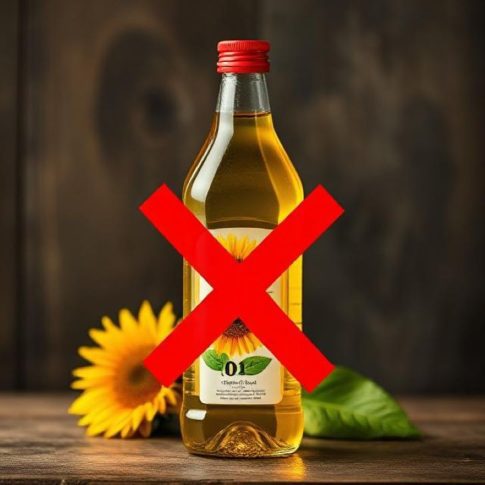Why You Should Never Use Sunflower Oil: The Hidden Risks of a Common Cooking Oil
Sunflower oil is a popular choice for cooking and frying due to its neutral flavor and high smoke point. However, recent research and growing awareness of its health and environmental impacts reveal that sunflower oil may not be as healthy or sustainable as once thought. Here are the key reasons why you should reconsider using sunflower oil in your kitchen.

1. High Omega-6 Fatty Acid Content
Sunflower oil is rich in omega-6 fatty acids, which are essential for the body in small amounts. However, the typical modern diet already contains excessive omega-6s due to the widespread use of processed foods and vegetable oils. An imbalance between omega-6 and omega-3 fatty acids can contribute to chronic inflammation, which is linked to a host of health issues, including:
- Heart disease
- Diabetes
- Arthritis
- Autoimmune disorders
For optimal health, experts recommend reducing omega-6 consumption and increasing omega-3 intake from sources like fish, flaxseeds, and walnuts.
2. Unstable at High Temperatures
While sunflower oil has a high smoke point, making it suitable for frying, it is not as stable as it seems. Sunflower oil is primarily composed of polyunsaturated fats, which are prone to oxidation at high temperatures. When heated, sunflower oil can produce harmful compounds such as aldehydes, which are toxic to the body and linked to an increased risk of cancer and neurodegenerative diseases.
For high-heat cooking, healthier alternatives like avocado oil, coconut oil, or ghee provide greater stability and nutritional benefits.
3. Processed and Refined
Most sunflower oil on the market is highly processed and refined. The manufacturing process often involves chemical solvents and high heat, which strip the oil of its natural nutrients and antioxidants. Furthermore, refining can introduce trans fats, which are well-documented contributors to heart disease, obesity, and inflammation.
Sunflower oil is often refined through processes that can involve bleaching, but the term “bleaching” in this context doesn’t mean using harsh chemicals like those associated with cleaning products. Instead, it’s a specific step in the oil refining process designed to improve the oil’s appearance and quality. Here’s what happens:
Why Bleaching Happens
Bleaching is used to:
- Remove impurities: This includes residual pigments, oxidized fats, and other unwanted compounds that might affect the oil’s stability or taste.
- Enhance color: Crude sunflower oil can have a yellow or reddish tint, and bleaching helps create a uniform, lighter color.
- Improve shelf life: By eliminating certain impurities, bleaching reduces the risk of rancidity.
How Bleaching Works
The process involves passing the oil through a filtration system with adsorbent materials like activated clay or carbon. These materials bind to unwanted compounds and filter them out of the oil. The process is carefully controlled to minimize the loss of beneficial nutrients, though some degradation of vitamins and antioxidants can occur.
Is It Harmful?
The bleaching process itself is not harmful if done correctly, as it doesn’t leave behind harmful residues. However, the problem with sunflower oil arises from the larger refining process, which often includes:
- Deodorization: Using high heat, which can produce trans fats.
- Chemical extraction: Using solvents like hexane, which might leave trace residues.
These steps collectively reduce the oil’s nutritional value and may introduce unhealthy compounds
Unrefined Sunflower Oil
If you’re concerned about the refining process, you can look for cold-pressed or unrefined sunflower oil, which is produced without bleaching or other refining steps. However, even unrefined sunflower oil has a high omega-6 content and may not be the healthiest choice for regular use.
Choosing minimally processed oils like extra virgin olive oil can provide health benefits without the risks associated with refined oils.
4. Potential for GMO Crops
A significant portion of sunflower crops is genetically modified to improve yield and pest resistance. While research on the long-term effects of genetically modified organisms (GMOs) is ongoing, many consumers prefer to avoid them due to concerns about environmental sustainability and health risks. Organic or non-GMO certified oils offer a safer choice for those prioritizing clean eating.
5. Negative Environmental Impact
Sunflower farming, like other large-scale monoculture crops, can have serious environmental consequences, including:
- Soil degradation due to intensive farming practices
- Excessive water use, especially in regions already experiencing water scarcity
- Biodiversity loss as land is cleared for sunflower cultivation
Switching to more sustainable oils, such as those derived from regenerative agriculture practices, can reduce your carbon footprint and support healthier ecosystems.
6. Better Alternatives Exist
There are many healthier and more sustainable cooking oil options available, including:
- Extra Virgin Olive Oil: High in monounsaturated fats and antioxidants, it supports heart health and reduces inflammation.
- Avocado Oil: With a high smoke point and rich nutrient profile, it is ideal for both cooking and salad dressings.
- Coconut Oil: A good source of medium-chain triglycerides (MCTs) that provide quick energy and support metabolic health.
- Ghee: A clarified butter with a high smoke point and rich, nutty flavor, ghee is excellent for frying and sautéing.
Conclusion
While sunflower oil may seem like a convenient and cost-effective option, its potential health risks and environmental downsides make it a less-than-ideal choice. By opting for healthier, more sustainable alternatives, you can improve your well-being and reduce your impact on the planet.
Making informed choices about the oils you use is a small but powerful step toward a healthier lifestyle and a more sustainable future.





